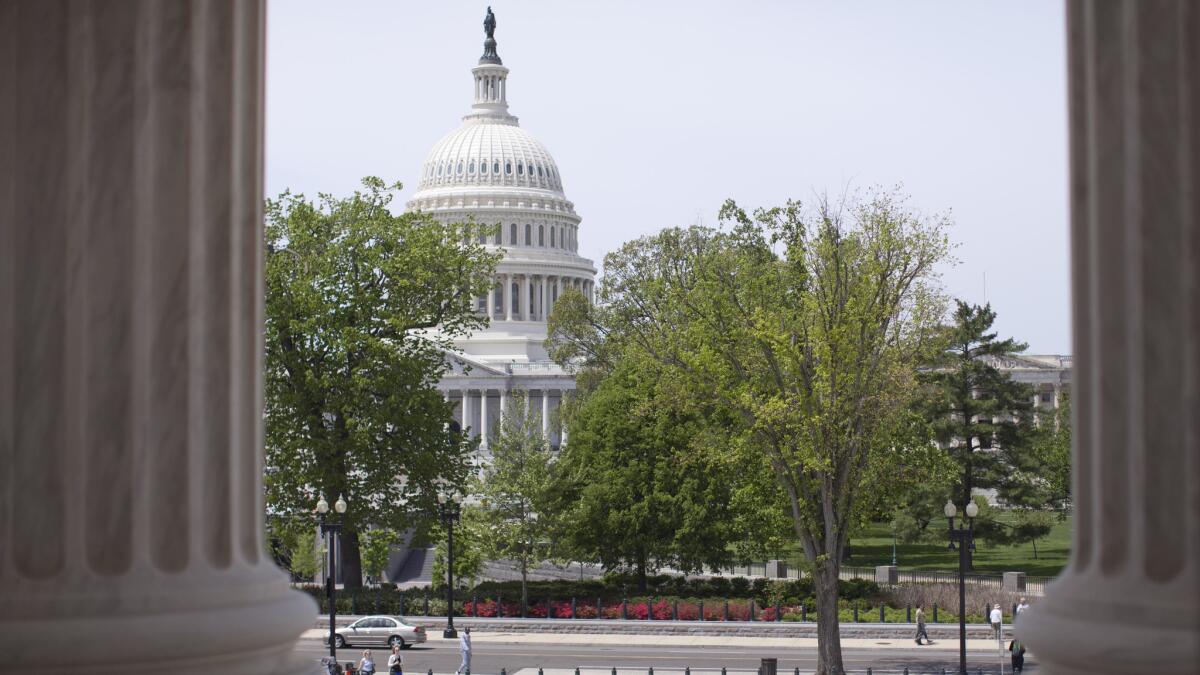Senate overhauls doctors’ Medicare payments in groundbreaking vote

The Senate bill overhauling doctors’ medicare payments passed with an overwhelming majority, 92 to 8. President
- Share via
Reporting from Washington — Medicare is poised to overhaul the way it pays physicians and create new systems to reward high-performing doctors under legislation approved by the Senate late Tuesday.
The unusually bipartisan bill, which passed the House easily last month, will immediately lift the threat of an automatic 21% cut in Medicare fees to physicians, which was set to take effect Wednesday.
The legislation also marks a milestone in the push to modernize Medicare, the nation’s mammoth federal insurance program for the elderly, and move it away from the traditional system of paying physicians for every procedure they perform.
The bill passed with an overwhelming majority, 92 to 8.
President Obama said he would be proud to sign the bill, calling it “a milestone for physicians, and for the seniors and people with disabilities who rely on Medicare for their healthcare needs.”
Groups that had pushed for years to change the payment system were also pleased.
“We all witnessed something quite extraordinary and historic today,” said Dr. David A. Fleming, president of the American College of Physicians. “Physicians and their patients no longer will have to be concerned with impending yearly payment cuts … and no longer will this burden of uncertainty be hanging over physician practices.”
The legislation emerged from a compromise negotiated by House Speaker John A. Boehner (R-Ohio), House Democratic leader Nancy Pelosi (D-Calif.) and their lieutenants. It replaces an arcane Medicare fee system that has been widely criticized almost since its creation in 1997.
The system, known as the Sustainable Growth Rate formula, was designed to control Medicare spending by limiting annual increases in physicians’ reimbursements.
But year after year, as automatic cuts threatened to slash Medicare fees, physician groups warned of dire consequences for medical practices and patients, setting off repeated scrambles in Congress to override the mandated limits.
In place of the old limits, the legislation allows fees to increase 0.5% annually over the next four years.
Potentially more important, the bill creates new incentives in Medicare to pay physicians based on their performance, rewarding doctors who hit quality targets and whose patients get healthier and effectively penalizing those who do not.
The new quality incentives are relatively modest, falling short of the kind of reforms that would force physicians to take true responsibility for the total cost of their patients’ care and the outcomes patients experience.
“It’s important legislation for moving away from fee for service,” said Dr. Mark McClellan, who oversaw Medicare as administrator of the Centers for Medicare and Medicaid Services, or CMS, in the administration of President George W. Bush.
“But [it] leaves a lot of questions unanswered for CMS to address in implementing such alternative payment models,” he said.
The new payment system is nonetheless seen as progress at a time when doctors are struggling to adapt to historic changes in the healthcare system, many of them spurred by the Affordable Care Act.
Many observers doubted any major breakthroughs were possible at a time of fierce partisan divisions in Washington.
Politics once again threatened the bill as it was debated in the Senate, where Republicans and Democrats have sought changes since the House passed it last month.
On Tuesday, both parties sought amendments to the legislation, including one from Republicans to eliminate the requirement in the 2010 federal health law that Americans have health insurance.
Each amendment failed to attract the required votes to change the legislation, however.
What emerged was a classic compromise that requires trade-offs from both parties.
To offset some of the more than $200-billion cost of the package, Democrats agreed to minor increases in cost-sharing for Medicare beneficiaries.
The legislation places new, although limited, restrictions on popular insurance policies known as Medigap plans that millions of seniors buy to help pay for out-of-pocket medical expenses not covered by Medicare.
These plans will no longer pay the $147 deductible for physician services, although they would still cover the much higher $1,260 deductible for hospital care.
The bill also subjects the small number of seniors with individual incomes between $133,500 and $214,000 or joint incomes between $267,000 and $428,000 to higher Medicare Part B premiums. (Those with incomes beyond the upper limits would not see an increase.)
For their part, Republicans agreed not to offset most of the cost of the compromise, which was estimated to add about $140 billion to federal deficits over the next decade.
The financing of the package, which sparked fierce opposition from some conservative groups, prompted opposition from a handful of Republican senators.
In addition to the Medicare provisions, the legislation extends authorization for two years for the Children’s Health Insurance Program, or CHIP, a federally funded, state-based health plan that is widely credited with expanding coverage to millions of children from low- and moderate-income families.
Children’s advocates, many governors and most Senate Democrats had sought a four-year CHIP extension; failing to secure the needed votes for such a change, however, Democrats decided to back the bill anyway.
The legislation also extends funding for thousands of health clinics around the country that provide health services to low- and middle-income patients. A provision opposed by abortion rights groups will extend a long-standing prohibition on the federal funding for abortion services.
More to Read
Sign up for Essential California
The most important California stories and recommendations in your inbox every morning.
You may occasionally receive promotional content from the Los Angeles Times.










